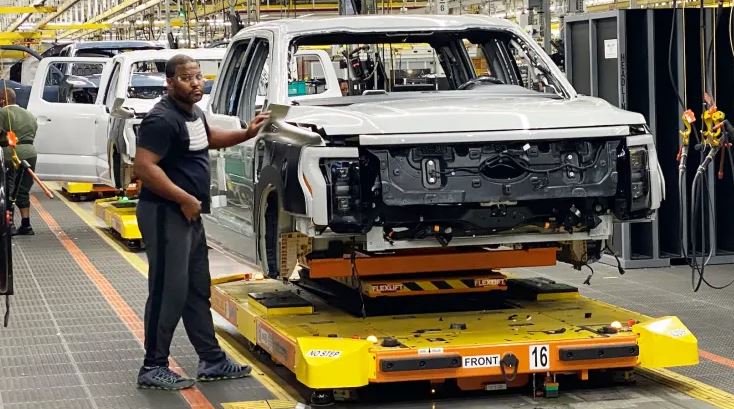Ford Motor has revised its electric vehicle (EV) production plans downward, echoing the trend among automakers facing slower-than-anticipated growth in EV sales. In a memo sent to suppliers, Ford disclosed that it now expects to manufacture an average of 1,600 electric F-150 Lightning pickup trucks per week in 2024. This figure represents a significant reduction, roughly half of the initial production target.
The revised target reflects a broader industry trend as automakers, including General Motors (G.M.), reassess their EV production plans due to subdued consumer demand over the past six months. Both Ford and G.M. had been striving to ramp up production of various electric vehicles, but high vehicle prices, concerns about charging infrastructure, and consumer reluctance have impeded the anticipated surge in EV sales.
G.M. previously aimed to produce 400,000 electric vehicles by mid-2024 but abandoned that target in November, opting to delay some new electric models. Rivian, a newer entrant in the automotive market, has similarly scaled back its projections, aiming to manufacture 52,000 electric vehicles by the end of the current year, a third of its eventual annual production goal of 150,000.
Ford initially aspired to have the capacity to produce 600,000 battery-powered vehicles annually by the end of 2023. As recently as September, Ford set a target of manufacturing 150,000 electric F-150s per year, equivalent to approximately 3,000 vehicles weekly. The company has also revised down its production plans for the electric sport utility vehicle, the Mustang Mach-E.
Amid these adjustments, Ford’s Chief Financial Officer, John Lawler, emphasized the need to align production capacity with market demand, acknowledging the evolving electric vehicle landscape. While the reduced target may be a retreat from earlier ambitious goals, Ford remains optimistic about surpassing 2023 production and sales levels for the Lightning in 2024.
Even with the scaled-back target, Ford’s sales of the F-150 Lightning have demonstrated notable growth. In the first 11 months of the current year, Ford sold over 20,000 of these electric trucks, marking a 50% increase compared to the same period in 2022. Overall, Ford’s electric vehicle sales exceeded 62,000 units, reflecting a 16% growth.
The broader auto industry’s enthusiasm for electric vehicles was initially sparked by the success of Tesla. Traditional automakers have invested billions in developing various electric models and adapting factories for electric vehicle production and battery manufacturing. However, Tesla has also faced challenges this year, prompting price reductions for its popular models and impacting profit margins.
Several automakers, including G.M., have delayed plans for new electric models. G.M. announced a postponement of electric versions for its Chevrolet Silverado and GMC Sierra pickups, along with the Chevrolet Equinox sport-utility vehicle. Honda also scrapped plans for a small electric car developed with G.M. earlier this year.
The affordability of electric vehicles remains a significant hurdle, with high battery prices contributing to elevated vehicle costs. Ford’s F-150 Lightning, initially priced at $40,000, saw a subsequent price increase, with the starting price now at $50,000, and the top-tier version beginning at $92,000. Charging infrastructure concerns and the availability of charging stations have also contributed to consumer hesitancy.
While automakers acknowledge the challenges, they continue to adapt their strategies to respond to market dynamics. Ford, for example, has four battery plants under construction in the U.S. Despite scaling back one of these plants in Michigan, the company remains committed to its electric future.
The industry’s initial optimism, driven by strong early interest and reservations for electric vehicles, has not translated into consistently robust sales. As the auto sector grapples with these challenges, automakers are refining their production plans, responding to demand fluctuations, and emphasizing a measured approach to avoid overbuilding.

